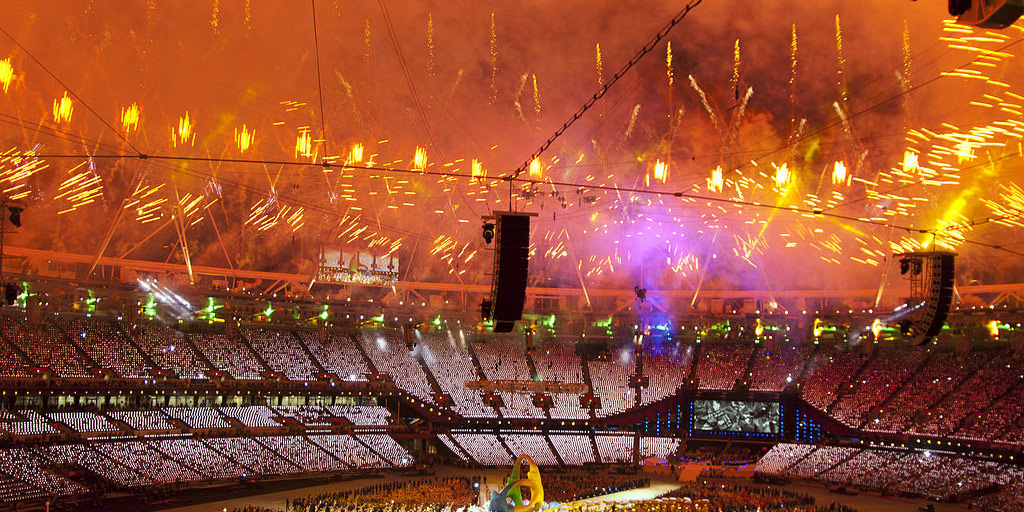Rumours of Grace: Collateral damage
 CREDIT: "RIO TAKEOVER" BY PHILIP ON FLICKR (CC BY 2.0)
CREDIT: "RIO TAKEOVER" BY PHILIP ON FLICKR (CC BY 2.0)Are sporting events, such as the Olympics, worth the sacrifice the country has to make, worth the amount of money the country has to pay?
By the time you read this the summer will be starting to appear in the rear view mirror. The school year is about to take off and it is worth asking if, even with the busyness of courses, there is opportunity to do good right here during the coming year.
But let’s begin with a few words about summer itself; according to an article in the Financial Times, Rio hosted the Olympics at a cost of about $6.2 billion. Cheap compared to, say, the London Summer Olympics, which came in at $15 billion, according to an article by National Public Radio.
But another real cost of Olympic events is not one we like to think about: the poor are typically dislocated to make room for stadiums and other facilities. Tens of thousands of police were on hand to reduce the chances of acts of violence. So we enjoyed the games, but perhaps with a bad conscience.
We enjoyed other aspects of summer with also, maybe, a bad conscience. Travel by car and plane, concerts, family reunions, visiting friends in other cities – all of it great stuff, but again, it does not come without a shadow. That shadow is that our entertainments and consumption are killing the planet.
As I am writing to meet the deadline for our orientation issue, the CBC has broadcast a number of items this summer revealing that the environment continues to deteriorate. Our global atmosphere is warming more quickly than had been thought. Thousands of animal species are at risk because we are destroying their habitats. Canadian astronaut Dr. Roberta Bondar stated during an interview that most people are not able to enjoy a view of the stars because of light pollution.
I am not trying to say that sport competitions and get-togethers with friends on summer weekends are wrong. But at the same time, we must ask if we can find more responsible ways to engage in good things, ways that do not cause so much collateral damage.
On the one hand, it seems that we can’t do much as human beings without at the same time causing collateral suffering. So, yes, some residents of Rio were removed from their homes to make way for Olympic facilities construction. But wasn’t it worth it?
Yet, when we make excuses for the suffering of innocents so we can have a spectacular sporting event, our priorities are out of line. Similarly, when we see the environment continuing to go south so that we can enjoy our trips to Jasper and make 300-kilometre trips to see the Tragically Hip, again, something is off balance.
Perhaps what is needed is a rediscovery of the value of sacrifice. All good comes through sacrifice. Athletes succeed only when they sacrifice their time to train. Our friendship and family connections thrive only when we tend to them with some care.
Catholics and Protestants know that this pattern is embedded in the world God has created. Even God lives by the pattern of sacrifice. He gives His energy to create and uphold the universe. And though our world has come to contain many evils, which we all contribute to, God gives of Himself to turn things around.
So, may this year of study also be a year of asking, “What do we, or I, need to sacrifice to make our world a better place?” “Is there a program to help students in need that can use our help?” “Is there a church-based community helping project that I can become a part of?” “Is there a way of being involved in sports that does not require expensive facilities, extravagant events and frequent travel?” “Is there a new habit that I can take up that will benefit the air, water and land?”
Without sacrifice, real change for the better is going to be extremely difficult. But with it, the damage we might leave behind can be replaced by healing.
Editorial opinions or comments expressed in this online edition of Interrobang newspaper reflect the views of the writer and are not those of the Interrobang or the Fanshawe Student Union. The Interrobang is published weekly by the Fanshawe Student Union at 1001 Fanshawe College Blvd., P.O. Box 7005, London, Ontario, N5Y 5R6 and distributed through the Fanshawe College community. Letters to the editor are welcome. All letters are subject to editing and should be emailed. All letters must be accompanied by contact information. Letters can also be submitted online by clicking here.













